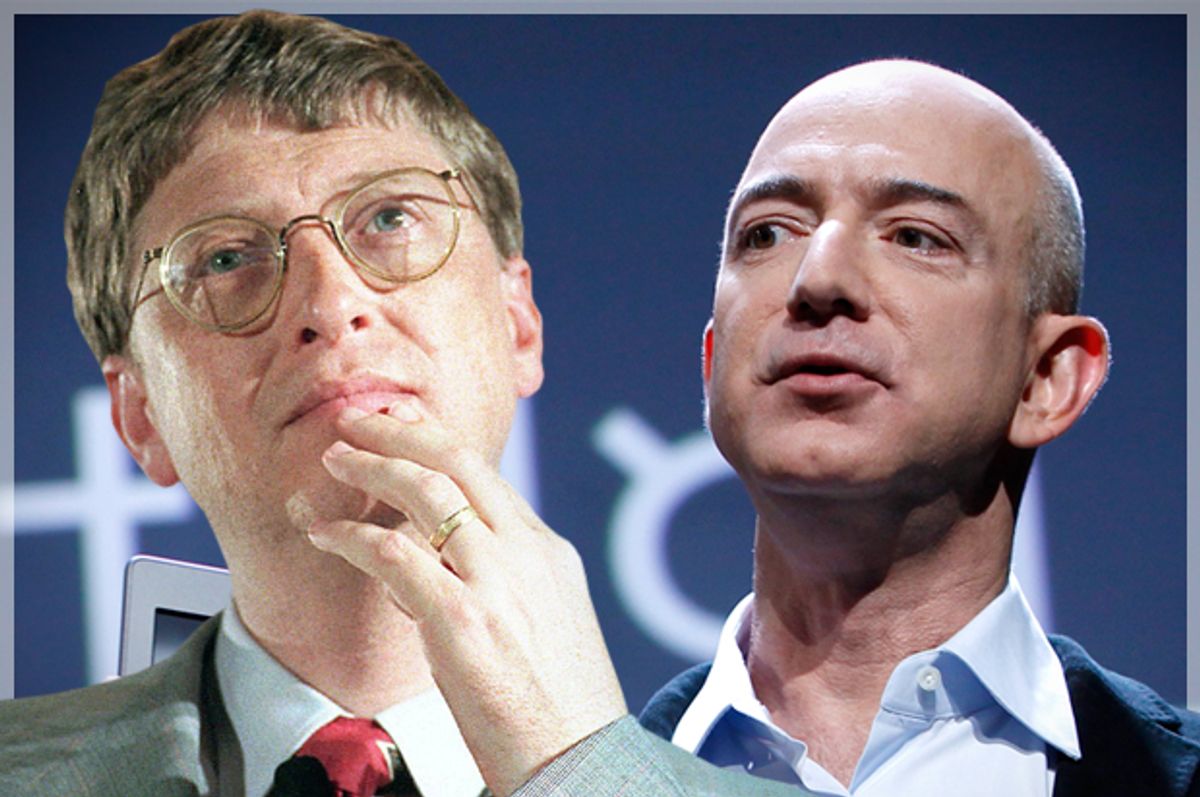America now has more billionaires than at any time in history, while most Americans are struggling to make ends meet. With such staggering inequality, it’s fair to ask: should we abolish billionaires?
There are basically only four ways to accumulate a billion dollars — and none of them is a product of so-called free market capitalism.
Billionaires themselves aren’t the problem. The real failure is in how our economy is organized.
One way to make a billion is to exploit a monopoly.
Jeff Bezos is worth $150 billion. You might say he deserves this because he founded and built Amazon. But Amazon is a monopoly with nearly 50 percent of all e-commerce retail sales in America (and e-commerce is one of the largest sectors of all retail sales). Consumers have few alternatives.
Nor do many suppliers who sell through Amazon; for the first 25 years of its existence, Amazon wouldn’t let them sell at a lower price anywhere else. And Amazon’s business is protected by patents granted Amazon by the U.S. government and enforced by government.
If we had tough anti-monopoly laws, and if the government didn’t grant Amazon so many patents and trademarks, Bezos would be worth far less.
The same applies to people like George Lucas, Oprah Winfrey, or any other figure whose brands, ideas or creations depend on copyrights and trademarks, which are laws that have been dramatically extended in recent decades.
If these were shortened, these people would be worth far less, too.
A second way to make a billion is to get insider information unavailable to other investors.
The hedge-fund maven Steven A. Cohen is worth an estimated $12.8 billion. Now, how did he do it? According to a criminal complaint filed by the Justice Department, insider trading at Cohen’s SAC Capital was “substantial, pervasive, and on a scale without known precedent in the hedge fund industry.”
Eight of Cohen’s present or former employees pleaded guilty or convicted for using insider information. Cohen got off with a fine, changed the name of the firm, and apparently is still at it.
A third way to make a billion is to pay off politicians.
The Trump tax cut was estimated to save Charlesand David Koch — each of whose net worth is estimated to be about $50 billion — and their Koch Industries — 1 to 1.4 billion dollarsa year,not even counting tax savings on offshore profits and a shrunken estate tax.
The Kochs and their affiliated groups spent an estimated $20 million lobbying for the Trump tax cut, including major donations to politicians.
Not a bad return on investment: More than a billion dollars a year back for $20 million put in.
Koch Industries has also been a major beneficiary of government programs to fill the Strategic Petroleum Reserve, provide roads and access to virgin growth forests, use eminent domain to seize private land for oil and gas pipelines, get oil subsidies, andprofit off federal lands.
A fourth way to be a billionaire is to get the money from rich parents or relatives.
About 60 percent of all the wealth in America today is inherited.
That’s because, under U.S. tax law — which is itself largely a product of lobbying by the wealthy — the capital gains of one generation are wiped out when those assets are transferred to the next, and the estate tax is so tiny that only 0.2 percent of estates were even subject to it in 2017.
America is creating a new aristocracy of people who never worked a day in their lives.
Let’s abolish billionaires by changing the way the economy is organized.
This doesn’t mean confiscating the wealth and assets of the super rich. It does mean getting rid of monopolies, stopping the use of insider information, preventing the rich from buying off politicians, and making it harder for the super-rich to avoid paying taxes.
In other words, creating a system in which economic gains are shared more widely.
Entrepreneurs like Jeff Bezos would be just as motivated by say, a $100 million or even $50 million.
But the cost to our democracy of billionaires with enough wealth and power to dictate the rules of capitalism for their own benefit is incalculable.



Shares